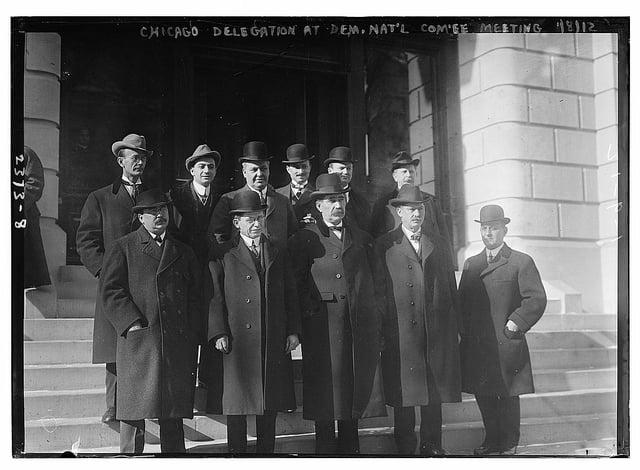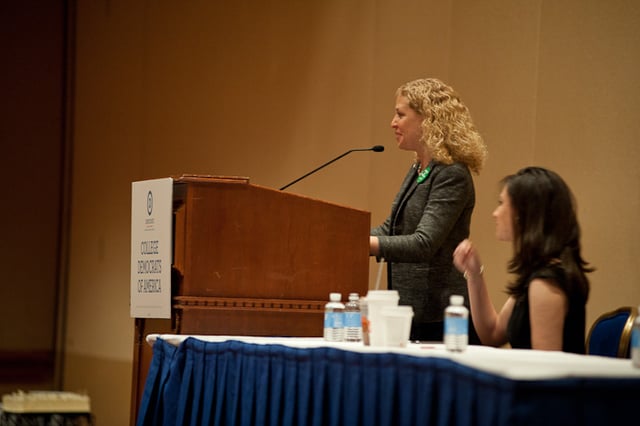Democratic National Committee

Democratic National Committee
The Democratic National Committee (DNC) is the formal governing body for the United States Democratic Party. The committee coordinates strategy to support Democratic Party candidates throughout the country for local, state, and national office. It organizes the Democratic National Convention held every four years to nominate and confirm a candidate for president, and to formulate the party platform. While it provides support for party candidates, it does not have direct authority over elected officials.[3]
The DNC is composed of the chairs and vice-chairs of each state Democratic Party committee and more than 200 members elected by Democrats in all 50 states and the territories.
Its chair is elected by the committee.
It conducts fundraising to support its activities.[3]
The DNC was established at the 1848 Democratic National Convention.[1] The DNC's main counterpart is the Republican National Committee.
Campaign role

Chicago delegation to the January 8, 1912 Democratic National Committee
The DNC is responsible for articulating and promoting the Democratic platform and coordinating party organizational activity.
When the president is a Democrat, the party generally works closely with the president.
In presidential elections it supervises the national convention and, both independently and in coordination with the presidential candidate, raises funds, commissions polls, and coordinates campaign strategy.
Following the selection of a party nominee, the public funding laws permit the national party to coordinate certain expenditures with the nominee, but additional funds are spent on general, party-building activities.[4] There are state committees in every state, as well as local committees in most cities, wards, and towns (and, in most states, counties).
The chairperson of the DNC is elected by vote of members of the Democratic National Committee.[5] The DNC is composed of the chairs and vice-chairs of each state Democratic Party's central committee, two hundred members apportioned among the states based on population and generally elected either on the ballot by primary voters or by the state Democratic Party committee, a number of elected officials serving in an ex officio capacity, and a variety of representatives of major Democratic Party constituencies.
The DNC establishes rules for the caucuses and primaries which choose delegates to the Democratic National Convention, but the caucuses and primaries themselves are most often run not by the DNC but instead by each individual state. Primary elections, in particular, are invariably conducted by state governments according to their own laws. Political parties may choose to participate or not participate in a state's primary election, but no political party executives have any jurisdiction over the dates of primary elections, or how they are conducted.
Outside of the process of nominating a presidential candidate, the DNC's role in actually selecting candidates to run on the party ticket is minimal.
All DNC members are superdelegates to the Democratic National Convention whose role can influence a close primary race. These delegates, officially described as "unpledged party leader and elected official delegates," fall into three categories based on other positions they hold:[6]
elected members of the Democratic National Committee,
sitting Democratic governors and members of Congress, and
distinguished party leaders, consisting of current and former presidents, vice presidents, congressional leaders, and DNC chairs, are all superdelegates for life.
DNC fundraising
In the 2002 election cycle, the DNC and its affiliated committees (which include numerous local committees and committees formed to coordinate expenditures for specific districts or races) raised a total of US$162,062,084, 42% of which was hard money. The largest contributor, with US$7,297,937 was the Saban Capital Group, founded in 2001 by Haim Saban. Fred Eychaner, the owner of Newsweb Corporation, gave the second highest amount of money to the DNC and its affiliates, US$5,175,000. The third largest contributor was Steve Bing of Shangri-La Entertainment, who gave US$4,758,000.[7]
In the 2006 election cycle, the DNC raised a total of US$37,939,887.
The three largest contributors were investment bank Goldman Sachs (US$225,600). University of California (US$121,980) and Pond North LLP (US$109,296).[8]
The DNC introduced a small-donor fund raising campaign, the Democracy Bonds program, set up by Howard Dean in the summer of 2005.[9] There were only 31,000 Democracy Bond donors by May 2006, off-pace from the goal of 1 million donors by 2008. The program no longer is in place.
In the 2016 election cycle, the DNC raised a total of US$75,945,536 as of July 21, 2016.
The three largest contributors were hedge fund Renaissance Technologies (US$677,850), Newsweb Corp (US$334,000) and Total Wine (US$298,100).[10]
In June 2008, after Senator Barack Obama became the presumptive Democratic presidential nominee, Dean announced that the DNC, emulating the Obama campaign, would no longer accept donations from federal lobbyists.[11] In July 2015, during the 2016 election cycle, the DNC, led by Debbie Wasserman Schultz, reversed this policy.[12]
Current leadership
Chair: Tom Perez, former U.S. Secretary of Labor under Barack Obama[13]
Vice Chair of Civic Engagement and Voter Participation: Karen Carter Peterson[14]
Vice Chairs: Michael Blake, New York Assemblyman[14] Jaime Harrison, Associate Chair and former South Carolina Democratic Party Chairman[14] Maria Elena Durazo, Executive Secretary–Treasurer of the AFL-CIO[15] Ken Martin, Chair of the Minnesota Democratic-Farmer-Labor Party[16] Grace Meng, U.S. Representative from New York's 6th congressional district[17]
Treasurer: William "Bill" Derrough[18]
Secretary: Jason Rae[19]
Finance Chair: Chris Korge II[15]
In addition, a National Advisory Board exists for purposes of fundraising and advising the executive.
The present chair is Elizabeth Frawley Bagley, former U.S. Ambassador to Portugal.
List of DNC Chairs
| Officeholder | Term | State[20] |
|---|---|---|
| Benjamin F. Hallett | 1848–1852 | Massachusetts |
| Robert Milligan McLane | 1852–1856 | Maryland |
| David Allen Smalley | 1856–1860 | Vermont |
| August Belmont | 1860–1872 | New York |
| Augustus Schell | 1872–1876 | New York |
| Abram Stevens Hewitt | 1876–1877 | New York |
| William H. Barnum | 1877–1889 | Connecticut |
| Calvin Stewart Brice | 1889–1892 | Ohio |
| William F. Harrity | 1892–1896 | Pennsylvania |
| James K. Jones | 1896–1904 | Arkansas |
| Thomas Taggart | 1904–1908 | Indiana |
| Norman E. Mack | 1908–1912 | New York |
| William F. McCombs | 1912–1916 | New York |
| Vance C. McCormick | 1916–1919 | Pennsylvania |
| Homer S. Cummings | 1919–1920 | Connecticut |
| George White | 1920–1921 | Ohio |
| Cordell Hull | 1921–1924 | Tennessee |
| Clem L. Shaver | 1924–1928 | West Virginia |
| John J. Raskob | 1928–1932 | New York |
| James A. Farley | 1932–1940 | New York |
| Edward J. Flynn | 1940–1943 | New York |
| Frank C. Walker | 1943–1944 | Pennsylvania |
| Robert E. Hannegan | 1944–1947 | Missouri |
| J. Howard McGrath | 1947–1949 | Rhode Island |
| William M. Boyle | 1949–1951 | Missouri |
| Frank E. McKinney | 1951–1952 | Indiana |
| Stephen Mitchell | 1952–1955 | Illinois |
| Paul M. Butler | 1955–1960 | Indiana |
| Henry M. Jackson | 1960–1961 | Washington |
| John Moran Bailey | 1961–1968 | Connecticut |
| Larry O'Brien | 1968–1969 | Massachusetts |
| Fred R. Harris | 1969–1970 | Oklahoma |
| Larry O'Brien | 1970–1972 | Massachusetts |
| Jean Westwood | 1972 | Utah |
| Robert S. Strauss | 1972–1977 | Texas |
| Kenneth M. Curtis | 1977–1978 | Maine |
| John C. White | 1978–1981 | Texas |
| Charles Manatt | 1981–1985 | California |
| Paul G. Kirk | 1985–1989 | Massachusetts |
| Ron Brown | 1989–1993 | New York |
| David Wilhelm | 1993–1994 | Ohio |
| Debra DeLee | 1994–1995 | Massachusetts |
| Chris Dodd1Donald Fowler | 1995–1997 | Connecticut South Carolina |
| Roy Romer1Steven Grossman | 1997–1999 | Colorado Massachusetts |
| Ed Rendell1Joe Andrew | 1999–2001 | Pennsylvania Indiana |
| Terry McAuliffe | 2001–2005 | Virginia |
| Howard Dean | 2005–2009 | Vermont |
| Tim Kaine | 2009–2011 | Virginia |
| Donna Brazile2 | 2011 | Louisiana |
| Debbie Wasserman Schultz | 2011–2016[21] | Florida |
| Donna Brazile2 | 2016–2017 | Louisiana |
| Tom Perez | 2017–present | Maryland |
| 1 — General Chair, served concurrently with National Chair (1995–2001)2 — Interim Chair | ||
Source [53]
List of DNC Deputy Chairs
Controversies
Position on presidential candidate climate crisis debate
Tom Perez has said there will be no debate dedicated to the climate crisis.
Originally, he also said any candidate who participates in a debate not sponsored by the DNC will be barred from all future official DNC debates.
Some critics see these rules as clear signs the DNC is in the pocket of the fossil fuel industry.
Others see it as a sign that the DNC is afraid giving the climate crisis attention will only feed right wing anti-socialist propaganda.
As of August 2019, the DNC is not attempting to limit the candidates' participation in a CNN town hall or an MSNBC forum on the topic.
[24] Critics of the DNC note that the U.S. military has identified the climate crisis as their greatest national security threat, and has prepared for water wars, growing climate refugees, and resulting social upheaval due to drought, such as those seen during the Arab Spring, and in Syria, Yemen, and Central America. Thus, critics of the DNC have reason to believe they must be corrupt to downplay the climate crisis, and point to the corruption of the 2016 election as reason not to trust them in 2019 and 2020.
Watergate incident
In the 1970s, the DNC had its head office in the Watergate complex, which were burglarized by entities working for Richard Nixon's administration during the Watergate scandal.
Chinagate
The Chinagate was an alleged effort by the People's Republic of China to influence domestic American politics prior to and during the Clinton administration and also involved the fund-raising practices of the administration itself.[25][26][27]
Illegal fund raising
In 2002, the Federal Election Commission fined the Democratic National Committee $115,000 for its part in fundraising violations in 1996.[28]
DNC hacking

Debbie Wasserman Schultz served as DNC chair from 2011 to 2016.
Cyber attacks and hacks were claimed by or attributed to various individual and groups such as:
According to committee officials and security experts, two competing Russian intelligence services were discovered on DNC computer networks sometime in May 2016. One intelligence service achieved infiltration beginning in the summer of 2015 and the other service breached and roamed the network beginning in April 2016. The two groups accessed emails, chats, and research on an opposing presidential candidate. They were expelled from the DNC system in June 2016.[29][30][31]
The hacker Guccifer 2.0 claimed that he hacked into the Democratic National Committee computer network and then leaked its emails to both the newspaper The Hill[32][33] and the whistleblowing website WikiLeaks.[34] During a CNN interview with Jake Tapper, Hillary Clinton’s campaign manager, Robby Mook, cited experts saying that the DNC emails were leaked by the Russians. When pressed to name the "experts," Mook declined to.[35][36] The press and cybersecurity firms discredited the Guccifer 2.0 claim, as investigators now believe Guccifer 2.0 was an agent of the G.R.U., Russia's military intelligence service."[29][31][37][38]
Coordination with 2016 Clinton primary campaign
On July 22, 2016, WikiLeaks released approximately 20,000 DNC emails.[39] Critics claimed that the Committee unequally favored Hillary Clinton and acted in support of her nomination while opposing the candidacy of her primary challenger Bernie Sanders. Donna Brazile corroborated these allegations in an excerpt of her book published by Politico in November 2017, and also claimed that the Clinton campaign bought control of the DNC.[40] The leaked emails spanned sixteen months, terminating in May 2016.[41] The hack was claimed by Guccifer 2.0, but several cybersecurity firms believe this assertion is false, instead alleging that the hacks were perpetrated by Russia, as mentioned above.[42]
The WikiLeaks releases led to the resignations of Chairperson Debbie Wasserman Schultz, Communications Director Luis Miranda, Chief Financial Officer Brad Marshall and Chief Executive Amy Dacey.[43] After she was fired, Wasserman-Schultz put out a statement about possible FBI assistance in investigating the hacking and leaks, claiming "the DNC was never contacted by the FBI or any other agency concerned about these intrusions."[44] During a Senate hearing in January of 2017, James Comey testified that the FBI requested access to the DNC's servers, but were denied. He also testified that old versions of the Republican National Committee's servers were attempted to be breached, but were unsuccessful.[45]
The DNC subsequently filed a lawsuit in federal court against WikiLeaks and others alleging a conspiracy to influence the election.[46]
History
The Democratic Party's national committee has existed since 1848.[47] During the 1848 Democratic National Convention, a resolution was passed creating the Democratic National Committee, composed of thirty members, one person per state, chosen by the states' delegations, and chaired by Benjamin F. Hallett.[48]
See also
Green National Committee
Libertarian National Committee
Republican National Committee
Information published by WikiLeaks